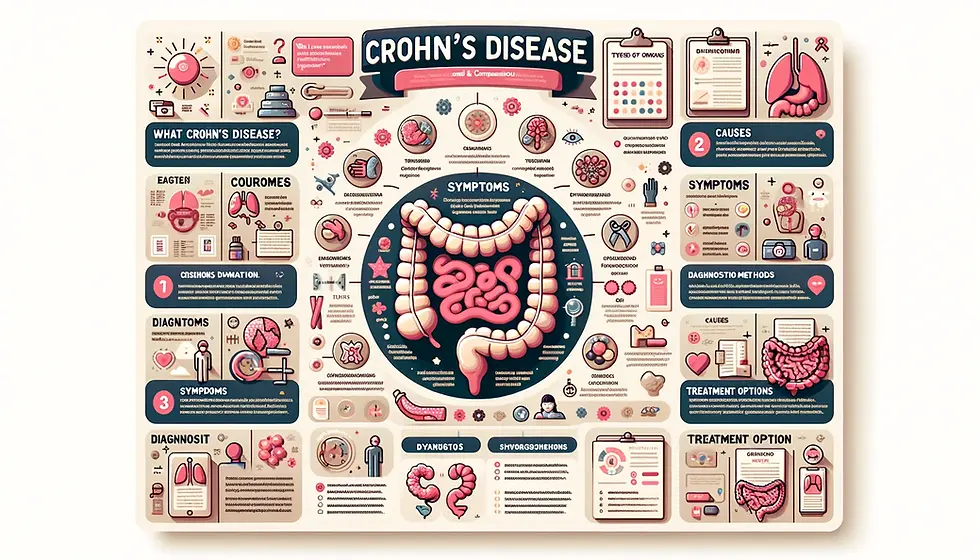Crohn's Disease Types, Causes, Symptoms, Diagnosis, and Treatment
- Doctoury
- May 27, 2024
- 3 min read
Updated: Mar 8
Crohn's Disease Causes Symptoms Diagnosis and Treatment
Crohn's disease is a chronic inflammatory condition of the gastrointestinal tract that significantly affects the lives of millions worldwide. This blog post aims to provide a comprehensive understanding of Crohn's disease, its types, causes, symptoms, diagnosis methods, and available treatments. Additionally, we'll explore potential preventive measures to manage and mitigate the impact of this debilitating condition.
Crohn's disease is a type of inflammatory bowel disease (IBD) that can affect any part of the gastrointestinal tract, from the mouth to the anus. It is characterized by inflammation that spreads deeply into the layers of the affected bowel tissue, causing pain, severe diarrhea, fatigue, weight loss, and malnutrition. The inflammation caused by Crohn's disease can lead to life-threatening complications and significantly impair a person's quality of life.

Crohn's disease is categorized based on the location and nature of the inflammation:
Ileocolitis: The most common form, affecting the end of the small intestine (ileum) and the large intestine (colon).
Ileitis: Involves only the ileum.
Gastroduodenal Crohn's disease: Affects the stomach and the beginning of the small intestine.
Jejunoileitis: Features patchy areas of inflammation in the upper half of the small intestine (jejunum).
Crohn's (granulomatous) colitis: Involves only the colon.
The exact cause of Crohn's disease remains unknown. However, it likely results from a complex interplay of factors:
Genetics: A family history of Crohn's disease increases the risk.
Immune System: An abnormal immune response may cause the immune system to attack the digestive tract.
Environmental Factors: Smoking, a high-fat diet, and living in an urban area or industrialized country may increase the risk.
Symptoms vary but typically include:
Persistent diarrhea
Abdominal pain and cramping
Blood in the stool
Fatigue
Weight loss
Malnutrition
Diagnosing Crohn's disease involves a combination of procedures:
Blood Tests: Check for anemia or signs of infection.
Fecal Occult Blood Test (FOBT): Checks for hidden blood in the stool.
Colonoscopy: Allows direct visualization of the colon and the terminal ileum while enabling biopsy to confirm inflammation.
CT or MRI Scans: Provide detailed images of the bowel to detect complications.
There is no cure for Crohn's disease, but treatments can greatly reduce its signs and symptoms and even bring about long-term remission:
Anti-inflammatory drugs: First step in treatment.
Immune system suppressors: Reduce inflammation by targeting the immune system.
Antibiotics: Treat abscesses or fistulae.
Nutrition therapy: Ensures adequate nutrition, sometimes requires special diets or nutritional supplements.
Surgery: Necessary when other treatments fail, to remove damaged parts of the digestive tract.
While Crohn's disease cannot be prevented due to its unknown exact causes, certain lifestyle changes can reduce the risk and manage symptoms:
Quit Smoking: Smoking is a major risk factor and quitting can significantly reduce the risk.
Dietary Adjustments: Eating a well-balanced diet and avoiding trigger foods can help manage symptoms.
Regular Exercise: Helps maintain overall health and can reduce the severity of symptoms.
Understanding Crohn's disease is crucial for managing and treating it effectively. Although challenging, with the right treatment plan and lifestyle changes, individuals can lead fulfilling lives. Staying informed, consulting healthcare professionals, and maintaining a supportive network are vital steps in managing Crohn's disease. If you suspect you have symptoms of Crohn's disease, consult a healthcare provider for a thorough evaluation and personalized treatment plan.
Comments